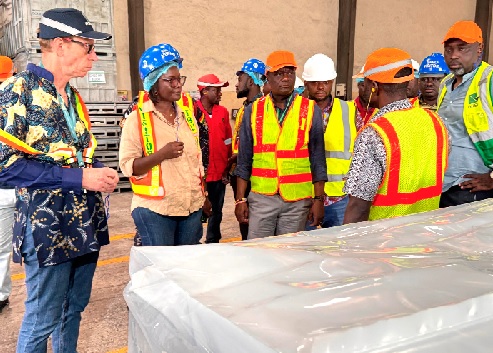The export of raw rubber without value addition has assumed an alarming level, pushing the country to miss out on potential economic benefits such as foreign exchange inflow.
The Western Regional Minister, Joseph Nelson, who expressed worry about the phenomenon, said the issue could also affect job creation, revenue enhancement, and threaten the country's industrialisation drive.
As a matter of urgency, the export of raw rubber must be halted because the country has enough processing capacity to add value and create jobs in-country, the Regional Minister said when he paid a courtesy visit to the primary processing factory of the Ghana Rubber Estates Limited (GREL) at Apimanim in the Ahanta West Municipality in the Western Region.
Raw rubber
His call follows the increase in middlemen who have invaded the rubber-growing regions to buy tapped rubber from farmers for export, thereby starving the country’s raw rubber processing plants of raw material.
![]()
Joseph Nelson (2nd from left), Western Regional Minister, examining some of the semi-processed rubber products ready for export
As a result, the operations of Ghana Rubber Estates Limited (GREL), in which the government holds a 26.75 per cent stake, and other small-scale processors, which together employ thousands of Ghanaians, are not processing to their full capacity.
Speaking after touring the GREL factory, Mr Nelson said considering the level of investment rubber processing facilities had made in the country, starving them of the raw material was worrisome.
“It does not make sense to have sufficient mature raw rubber trees at the plantations which are being tapped on a daily basis, yet processing facilities such as GREL are struggling to get enough raw rubber for processing.
If this continues, the 24-hour Economy mandate will be defeated in this part of the country,” he said.
The Regional Minister said, “The time has come to engage the Tree Crop Development Authority (TCDA) to find a solution to the export of raw rubber that the country clearly has the capacity to process.”
He said TCDA must go beyond setting prices and address the market forces distorting the system.
Mr Nelson said value addition was the future of the country, adding that the dependence on external markets for exporting raw materials such as gold, cocoa, rubber, bauxite and manganese had to change.
The Western Regional Minister reaffirmed the government’s commitment to formulating policies and initiatives that strengthened local processing and maximised the value of the country’s natural resources and export commodities.
GREL’s vital role
The Managing Director of GREL, Thierry Cauchy, underscored the vital role the company played in Ghana’s economy.
He cited the company’s significant investments, taxes to the state, employment opportunities and social investments, among others, even though it grappled with operational challenges.
Mr Cauchy said GREL had installed capacity to process all the raw rubber produced in-country, and “adding the capacity of other rubber processing factories in the country to that of GREL clearly shows that Ghana has more installed processing capacity to process all the raw material available.”
Much-needed forex
He said there was a need to ensure that all raw rubber produced in growing regions was processed in Ghana to add value to bring in the much-needed foreign exchange earnings, and to create the needed jobs.
Mr Cauchy said in 2024, the foreign exchange earnings were $98 million as against a potential of $160 million, adding that until the company had access to more raw rubber to process, “this will further reduce this year due to the smuggling of unprocessed rubber.”
“Our business starts from the nursery, growing plants and finishes at the port, where we export mainly to international tyre manufacturers such as Michelin, Bridgestone, Pirelli, and Apollo,” Mr Cauchy said.
Ghana currently produces about 90,000 tonnes of rubber annually, of which more than 70,000 tonnes come from outgrowers.
GREL operates in the Western, Central and Eastern regions with two factories at Apemanim and Tisbu in the Ahanta West Municipality.
The company’s factory can process 90,000 tonnes a year, scalable to 140,000 tonnes through round-the-clock shifts.
Since 2018, the company has invested more than GH¢840 million, including the construction of its second factory.
Mr Cauchy said the company required capital injection from the government and its majority shareholder, SIPH, to keep operations running.

